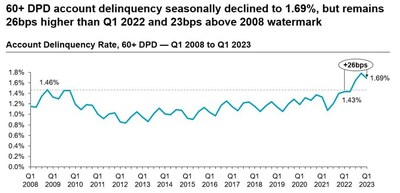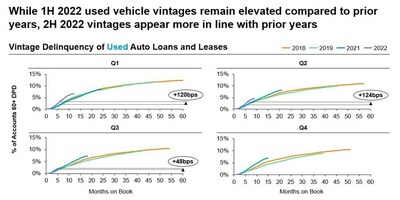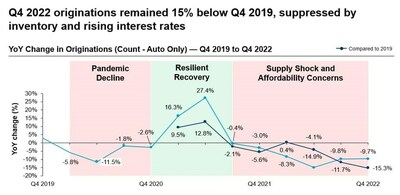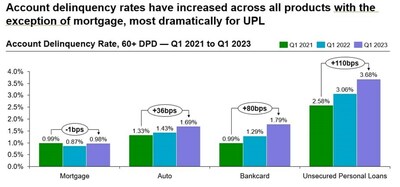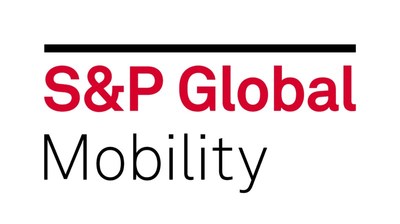Press Releases
The surge is concentrated primarily in subprime, with remaining categories remaining near historic norms. Tightening credit means recent-vintage loans should stabilize the market.
SOUTHFIELD, Mich., June 20, 2023 /PRNewswire/ -- With American households battling inflation and rising interest rates, auto lenders are seeing increased occurrences of auto-loan delinquencies - but almost entirely in the subprime segment.
Surpassing levels last seen during the Great Recession, account-level delinquency rates of auto loans 60+ days past due (DPD) have risen 26 basis points from Q1 2021's 1.43% to 1.69% in Q1 2023, according to a recent Credit Industry Insight Report (CIIR) by TransUnion.
This has resulted in captive finance companies, banks, credit unions and independent lenders tightening underwriting standards on new- and used-vehicle loans to stem losses due to charge-offs, according to TransUnion/S&P Global Mobility AutoCreditInsight.
That said, there is nuance in the numbers, and TransUnion and S&P Global Mobility analysts urged caution in drawing sensationalistic conclusions across the broader auto-financing market.
The spike in delinquencies is not impacting a large slice of lenders - represented by OEM captive finance companies and major banks - doing near-prime, prime, prime-plus and super-prime originations. The brunt of the delinquencies is being felt by the independent lenders who operate in the subprime space and primarily lend for used-vehicle purchases.
"The interest rate rise is squeezing the monthly budget for the average American consumer," said Jill Louden, product management associate director for S&P Global Mobility. "Consumers set aside money monthly for housing, vehicles, and insurance, but may not pay other obligations with the same frequency, such as medical bills and credit cards. People need their vehicles to get to work to make money and pay their obligations."
Here is where the nuance really comes in. "Vintage performance" - which reflects the performance of an account in different periods of time after the loan was originated - continues to show relatively strong results in the new-vehicle segment, with more recent vintages remaining at pandemic-era lows and performing better than the pre-pandemic portfolio at the same age.
And while the used-vehicle portfolio's vintage performance had a worse start out the gate in H1 2022, lenders reacted quickly to manage delinquencies - resulting in originations in the second half of '22 showing improved performance at the same vintage, according to the TransUnion report.
"We continue to pay close attention to delinquencies, while seeing positive signs among vintage data," said Satyan Merchant, senior vice president and automotive business leader at TransUnion.
The used-vehicle market is expected to remain tight, as the low level of new car sales starting in 2020 means fewer recent model-year used cars available, Merchant added. Going forward, affordability remains critical to consumers, particularly those with credit scores below prime.
The tighter underwriting standards for auto loans, plus higher interest rates, combined with a renewed squeeze in used-car inventories and prices, have resulted in a decrease in loan originations. Originations for Q1 2023 are the lowest in four years: 5.87 million in Q1 2022 vs. Q1 2020 at 6.88 million, just as the pandemic started.
As the pandemic struck in earnest, lenders began pulling back from the deteriorating subprime market as the shuttered economy triggered massive job losses. On average, subprime volume since the Great Recession of 2008-11 has held steady at around 15% of total outstanding loans - but dipped to 12.3% and 12.9% respectively in Q1 2021 and Q1 2022 before rebounding to 14.2% in Q1 2023.
"Driven by lower inventories and higher interest rates, originations remain down from the same quarter a year ago," Merchant said. "However, as production begins to catch up to demand, there is hope that this trend will reverse course soon, at least among new cars."
But if misery loves company, the U.S. automotive lending industry is not alone. Account delinquency rates since Q1 2021 have increased across most of the major lending products, except when mortgages which declined in 12 basis points (bps) in Q1 2022 and regained 11 bps in Q1 2023 to remain relatively flat from Q1 2021 to Q1 2023, according to the report.
The tougher pills to swallow are the 60+ DPD account delinquency rates in bankcards and unsecured personal loans (UPL). In a two-year span since Q1 2021, the delinquency rate for the massive bankcard industry has risen 80 basis points from 0.99 percent to 1.79 percent. Meanwhile, in that same time span, UPLs have risen 110 basis points from 2.58 percent to 3.68 percent.
About S&P Global Mobility
At S&P Global Mobility, we provide invaluable insights derived from unmatched automotive data, enabling our customers to anticipate change and make decisions with conviction. Our expertise helps them to optimize their businesses, reach the right consumers, and shape the future of mobility. We open the door to automotive innovation, revealing the buying patterns of today and helping customers plan for the emerging technologies of tomorrow.
S&P Global Mobility is a division of S&P Global (NYSE: SPGI). S&P Global is the world's foremost provider of credit ratings, benchmarks, analytics and workflow solutions in the global capital, commodity, and automotive markets. With every one of our offerings, we help many of the world's leading organizations navigate the economic landscape so they can plan for tomorrow, today. For more information, visit www.spglobal.com/mobility.
Media Contact:
Michelle Culver
S&P Global Mobility
248.728.7496 or 248.342.6211
Michelle.Culver@spglobal.com
SOURCE S&P Global Mobility
